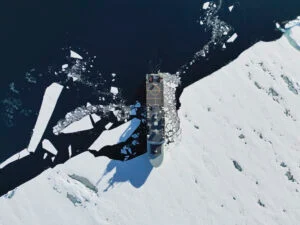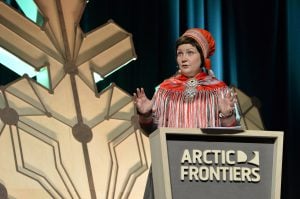
People & Culture
On thin ice: Who “owns” the Arctic?
As the climate heats up, so do talks over land ownership in the Arctic. What does Canadian Arctic Sovereignty look like as the ice melts?
- 4353 words
- 18 minutes
This article is over 5 years old and may contain outdated information.
Environment

In what has been described as a Coca-Cola commercial come to life, a dozen pairs of king penguins have spent nearly the past year acclimatizing to Canada’s central Arctic. Since June 2016, when a research group flew the birds to Cornwallis Island from the other side of the world, the sub-Antarctic birds have been living under the watchful eye of scientists and by all accounts, the rookery’s northern translocation has been a success.
The project — nicknamed Operation Flightless Dawn — is a federally funded, controversial effort to mitigate climate change’s impact on wildlife in the central Arctic, where disappearing ice cover is playing havoc with seal populations, along with the polar bears and orcas that depend on them.
So far, the proof-of-concept penguins have been limited to a pen on Cornwallis’ shore, with access to both land and a generous netted-in ocean area. It is the first time penguins have lived in the North since Norwegian research groups tried, unsuccessfully, to introduce them in the 1930s.
“Most king penguin colonies are very stable. The one at South Georgia’s St. Andrews Bay has hundreds of thousands of breeding pairs and will barely notice a few relocated birds,” says Robin Hawking, an ecological engineer and lead penguin re-conditioner. “And we’re very hopeful for their long-term breeding prospects in the Arctic.”

The project’s second phase — an air shipment of some 200 males and females from the same colony as the test penguins — is set to be waddling Cornwallis by August 2017.
“The hope is that eventually,” says Hawking, “the birds will be free to spread out and breed where they will, integrating into the ecosystem by feeding on Arctic Ocean squid and char and in turn becoming an abundant and nutritious food source for predators. We cannot wait to witness our first wild polar bear-penguin chase.”
The projected positive impacts do not stop there. The cost of food in Canada’s Arctic communities is high enough to routinely make national news, and once a colony is established, penguin meat could diversify the diet of locals and add affordable variety to grocery shelves in Resolute Bay and nearby hamlets. Penguin is not unlike seal, in many ways, similar to the marine mammal’s fishy, sweet meat, which is tender and packed with natural oils and vitamin C.
“It wasn’t for me,” says Hawking of his first taste of penguin steak, which the research team has affectionately dubbed “peef.” “But then neither is seal, and that’s a delicacy across the North and in many Newfoundland towns.”
Arctic tourism is also expected to receive a boost. “You wouldn’t believe how many people on our Arctic cruises ask where all the penguins are,” says Dismey Cruises spokesperson Lisa Profol. “Now our answer can finally be ‘April Fools’!’ ”
Are you passionate about Canadian geography?
You can support Canadian Geographic in 3 ways:

People & Culture
As the climate heats up, so do talks over land ownership in the Arctic. What does Canadian Arctic Sovereignty look like as the ice melts?

Environment
David Boyd, a Canadian environmental lawyer and UN Special Rapporteur on Human Rights and the Environment, reveals how recognizing the human right to a healthy environment can spur positive action for the planet

Environment
The uncertainty and change that's currently disrupting the region dominated the annual meeting's agenda

Environment
The Royal Norwegian Embassy and the Royal Canadian Geographical Society teamed up for two days of talks on the future of the Arctic and the “blue economy” in Norway and Canada